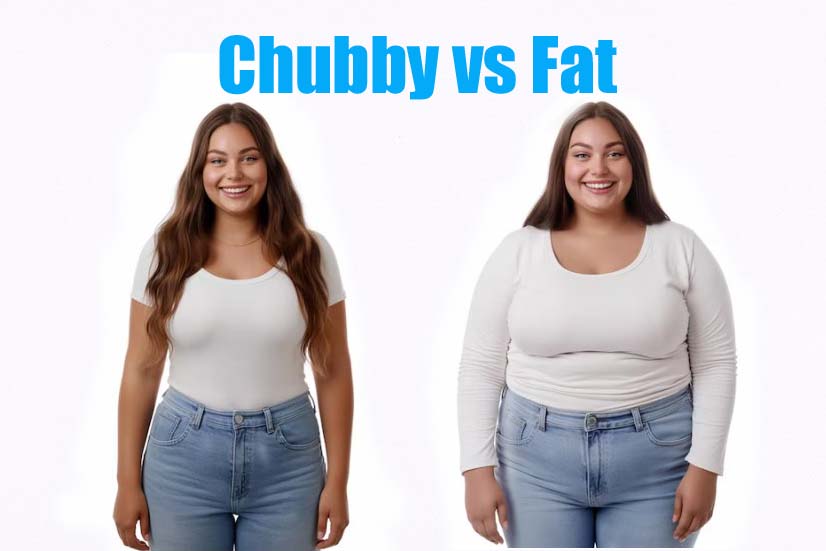In today’s world, discussions around body image and weight are more prevalent than ever. Terms like “chubby” vs “fat” are often used interchangeably, yet they hold different connotations and meanings. Understanding these differences is crucial for fostering a healthy body image and encouraging a more inclusive society.
Defining “Chubby” vs “Fat”
What does “chubby” mean?
The term “chubby” generally refers to a body type that is slightly overweight but still within a relatively healthy range. People often associate chubby with a softer, rounder body shape. It can imply a healthy, well-fed appearance, often without the negative connotations of being “fat.”
What does “fat” mean?
“Fat” is a term used to describe a body type with a higher amount of body fat, often significantly above what is considered a healthy weight range. Unlike “chubby,” being labeled “fat” often comes with more negative stereotypes and associations regarding health and attractiveness.
Common misconceptions
A common misconception is that being chubby or fat always correlates with poor health. However, many people categorized as chubby maintain active, healthy lifestyles. Conversely, some individuals with lower body weight may have underlying health issues.
Cultural Perspectives on Body Image
How different cultures view body weight
Different cultures have varied perceptions of body weight. In some societies, a fuller figure is seen as a sign of wealth and prosperity, while in others, slimness is equated with beauty and health.
Historical perspectives on body image
Historically, body weight ideals have shifted significantly. In certain eras, fuller bodies were celebrated, symbolizing fertility and abundance. Today, the Western ideal often leans towards slimness, though this is gradually changing.
“Chubby” vs “Fat” Health Implications
Health risks associated with being chubby
Being chubby can be associated with certain health risks, like increased chances of developing type 2 diabetes or hypertension. However, these risks are generally lower compared to being significantly overweight or obese.
Health risks associated with being fat
Higher levels of body fat are linked to more serious health conditions, including heart disease, type 2 diabetes, and various forms of cancer. It’s essential to understand that these risks increase with higher body fat percentages.
Psychological Impacts
Mental health effects of being labeled chubby
Being called chubby can affect self-esteem, especially in environments where thinness is idealized. However, the impact is often less severe than being labeled fat, as “chubby” can sometimes carry a more affectionate or benign connotation.
Mental health effects of being labeled fat
The term “fat” is often used derogatorily, leading to significant psychological stress, including anxiety, depression, and body dysmorphia. This negative labeling can deeply impact an individual’s mental well-being.
Societal Attitudes and Stereotypes
Media portrayal of body types
The media has a powerful influence on body image. Historically, media has favored slim, toned bodies, leading to unrealistic beauty standards. Recently, there’s been a shift towards more inclusive representation, but stereotypes persist.
Impact of societal attitudes on self-esteem
Society’s preference for thinness can severely impact self-esteem, especially among those who do not fit this ideal. Breaking these stereotypes is essential for promoting a healthier, more inclusive view of body diversity.
The Role of Genetics
How genetics influence body weight
Genetics play a significant role in determining body weight and composition. Some people may naturally have higher or lower body fat percentages due to their genetic makeup.
Differences in body composition
Understanding that everyone has a unique body composition can help in appreciating the diversity in body types. Genetics influence not just fat distribution, but also muscle mass and metabolic rate.
Diet and Lifestyle Factors
The role of diet in determining body weight
Diet is a crucial factor in determining body weight. Balanced, nutrient-rich diets contribute to maintaining a healthy weight, while poor eating habits can lead to weight gain.
The impact of lifestyle choices
Lifestyle choices, including physical activity levels, stress management, and sleep patterns, significantly influence body weight. A sedentary lifestyle coupled with poor dietary habits often leads to weight gain.
Exercise and Physical Activity
How exercise affects body weight
Regular physical activity helps regulate body weight and composition. Exercise not only burns calories but also builds muscle, contributing to a healthier body weight.
Recommended physical activities for different body types
Different body types may benefit from tailored exercise routines. For example, those with more body fat may start with low-impact activities like walking or swimming before progressing to more intense workouts.
Medical Interventions
When to consider medical help
Medical intervention may be necessary when lifestyle changes alone are insufficient for achieving a healthy weight. Consulting healthcare professionals is crucial for personalized advice.
Types of medical interventions available
Medical interventions can range from prescription medications to bariatric surgery, depending on the individual’s needs and health conditions. These interventions should be considered carefully and typically as a last resort.
The Importance of Self-Acceptance
Building a positive body image
Fostering a positive body image involves embracing and appreciating one’s body regardless of its size or shape. This includes focusing on health and well-being rather than appearance.
Strategies for self-acceptance
Practicing self-care, surrounding oneself with supportive individuals, and challenging negative thoughts are effective strategies for self-acceptance. Engaging in activities that boost confidence can also help.
The Role of Social Media
Social media’s influence on body image
Social media often portrays idealized body images, which can negatively impact self-esteem. However, it can also be a platform for body positivity and diversity.
Navigating social media positively
Following body-positive accounts and engaging with content that promotes self-acceptance can help navigate social media in a healthier way. It’s essential to remember that social media often showcases a curated version of reality.
Breaking Down Stereotypes
Challenging common stereotypes about body weight
Addressing and challenging stereotypes about body weight is vital for creating an inclusive society. This involves educating others and promoting diverse body representations in media.
Promoting body diversity and acceptance
Encouraging acceptance of all body types helps combat prejudice and discrimination. Celebrating body diversity promotes a healthier, more inclusive view of beauty.
Real-Life Stories and Examples
Personal stories of people labeled as chubby or fat
Hearing personal stories can provide insight into the challenges and triumphs faced by individuals labeled as chubby or fat. These narratives can inspire and educate others.
Success stories of overcoming stigma
Success stories of overcoming weight-related stigma highlight the resilience and strength of individuals. These stories can empower others to embrace their bodies and reject societal pressures.
Conclusion
Understanding the difference between “chubby” vs “fat” is essential for promoting a more inclusive and healthy perspective on body image. By challenging stereotypes, embracing body diversity, and focusing on overall well-being, we can foster a society that values individuals for who they are rather than how they look.
FAQs
How can I improve my body image?
Improving body image involves practicing self-care, engaging in positive self-talk, and surrounding yourself with supportive people. Focusing on what your body can do rather than how it looks is also beneficial.
Are there any health benefits to being chubby?
Being chubby can sometimes mean having a healthy, well-nourished body. It’s essential to focus on overall health and well-being rather than just weight.
How can society change its view on body weight?
Society can change its view on body weight by promoting body diversity in media, challenging stereotypes, and educating others about the importance of health over appearance.
What are some common myths about being fat?
Common myths include the belief that all fat people are unhealthy or that they lack self-control. These stereotypes are harmful and often untrue.
How can I support a friend struggling with body image issues?
Support a friend by listening without judgment, encouraging positive self-talk, and helping them find professional support if needed. Celebrate their strengths and qualities beyond appearance.











